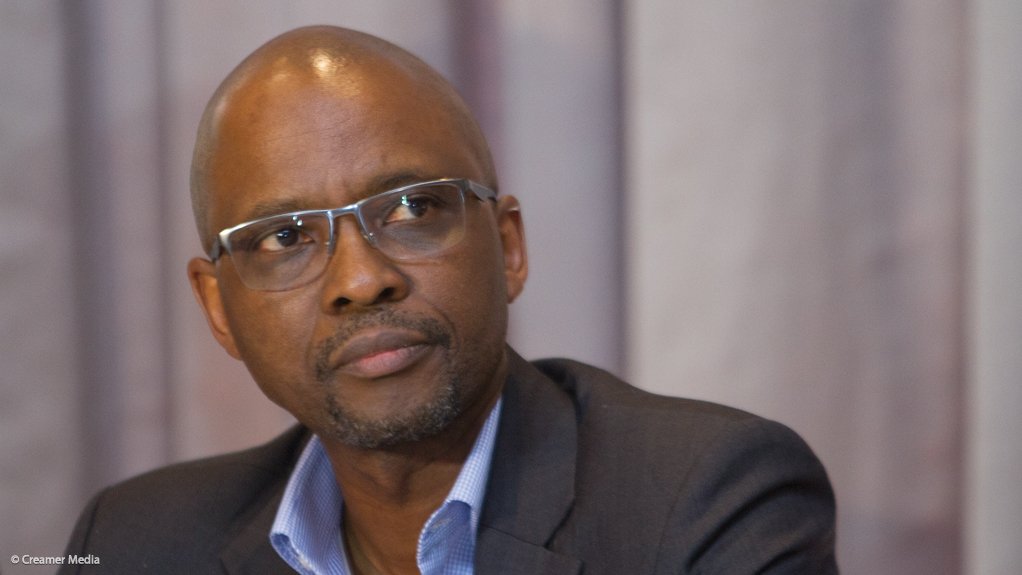JOHANNESBURG (miningweekly.com) – It is an organisation that is more relevant today than it has ever been in its 128-year history.
Its role is so much more than mining and it is operating in a changing environment.
With that in mind, the Chamber of Mines of South Africa is rethinking its identity and name, outgoing Chamber of Mines president Mike Teke said on Wednesday as he handed the mining industry’s leadership baton over to Mxolisi Mgojo, 57, the CEO of the R40-billion, 6 000-employee, black-controlled mining company Exxaro Resources.
Steve Phiri, CEO of Royal Bafokeng Platinum, was elected vice president and both Andile Sangqu, the executive head of Anglo American South Africa, and Neal Froneman, the CEO of Sibanye, were re-elected as vice presidents, with Froneman divulging, in response to Mining Weekly Online, that much work has been done to incorporate the Zambezi Protocol into the chamber’s strategy.
The Zambezi protocol is a blueprint developed by the Brenthurst Foundation for solving the current crisis in African mining.
“We have a good strategy and we’re going to continue to build on it,” Mgojo said.
“The change to the chamber’s name and the rebranding is to establish a new beginning,” said Froneman, who expected the outputs of considerable behind-the-scenes efforts would become visible as the organisation moved forward.
Chamber CEO Roger Baxter said that historical facts needed to be engaged as an industry, which was what the chamber had been doing.
Teke told the Investing in African Mining Indaba, in Cape Town, earlier this year, that there was no denying that mining, besides being the foundation of the South African economy, had also been one of the foundation stones of South Africa’s abhorrent apartheid past and that the industry had done itself a disservice by not fully acknowledging that fact.
The failure of the mining industry to admit its past continued to burden the industry and its reputation in the eyes of many of its stakeholders, Teke said in an unprecedented mea culpa speech covered by Creamer Media’s Mining Weekly Online.
“One of my greatest wishes is that the industry resolves to deal with this. And soon,” said KwaThema-born Teke, who declared a more direct link between profit and employee earnings as being "highly desirable" and expressed a determination to do more with the R2-billion yearly corporate social investment spend to better relationships with near-mine communities.
As the Zambezi Protocol spells out, solving the current crisis in the African mining sector requires moving from the current series of tactical actions to a more cohesive, inclusive and strategic approach.
The intent must be to exit the current backward-looking, destructive downward spiral in which mining is currently locked and shift to a positive, constructive cycle that offers a ‘win-win-win’ deal for all.
In a parallel move, the mission of the African Mining Vision is to work with African States and their national and regional organisations to promote the transformative role of mineral resources in the development of the continent, with its activities of the last quarter including a review of its mineral information strategy plus capacity building on contract negotiation.
At the chamber’s 127th annual general meeting Baxter disclosed that members had agreed to expand the office bearer team by an extra vice president to underpin key challenges that need addressing.
KwaZulu-Natal-born and US-educated Mxolisi Donald Mbuyisa Mgojo, who was unanimously elected by the entire chamber council, has widespread mining experience in coal, mineral sands, zinc and iron-ore – and heads a company that is also active in the generation of renewable energy.
He reiterated the viewpoint that South Africa’s current economic growth remains inadequate to drive the changes required for the country’s socioeconomic challenges.
Exxaro, which reported 185%-higher headline earnings of R4 621-million for the 12 months to December 31, is piloting digital mine organisation on an Internet of Things platform and Mgojo’s viewpoint is that innovative advancement is no longer a nice-to-have but an imperative for mining industry survival into the future.
He also believes that the vast tracts of land and abundant water supply held by mining companies around their mines should be used for community development through agriculture.
He has expressed the view to Mining Weekly Online that a mine is part of an ecosystem that should be serving and he believes that the mining industry should be proactive in designing mandatory social and labour plans and enterprise development around achieving energy, food and water security.
EMAIL THIS ARTICLE SAVE THIS ARTICLE ARTICLE ENQUIRY
To subscribe email subscriptions@creamermedia.co.za or click here
To advertise email advertising@creamermedia.co.za or click here











